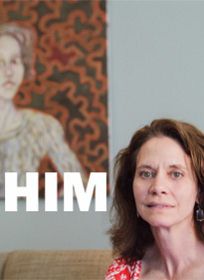THE FAMILY THAT STAYS TOGETHER HATES TOGETHER
The legacy of emotional damage inflicted on children by their parents is one of the main themes in Him, a new play by Daisy Foote – but the subtext is given an even more delicious dimension by the fact that Foote herself is the daughter of the magnificent late playwright Horton Foote, he of the Huge Moral Issue genre of drama. The show also features a star turn performance by Horton Foote’s other 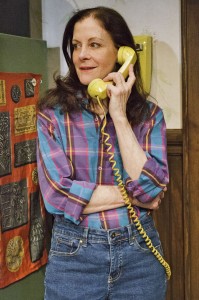 daughter, Hallie. Although very little of this play’s simmering drama approaches the towering ferocity of the works by Foote pere, Him still represents a remarkably potent meditation on family and the relationships between father and children; it’s inevitably difficult not to examine the play for clues to the Foote family dynamic itself.
daughter, Hallie. Although very little of this play’s simmering drama approaches the towering ferocity of the works by Foote pere, Him still represents a remarkably potent meditation on family and the relationships between father and children; it’s inevitably difficult not to examine the play for clues to the Foote family dynamic itself.
In a small Vermont town, three damaged siblings live in depressing squalor while tending to the tiny general store that their hateful, emotionally neglectful father opened years ago – and which they are still trying to operate even as gigantic megastores are opening up all around them. The unpleasant-sounding father is the “Him” of the play’s title – a mean, cantankerous soul who never had a kind word for his children. Bedridden from a stroke as the play opens, we never see or hear him – and he dies midway through – but his personality is so fierce, it has totally intimidated his three children, who all tremble in his shadow to various degrees.
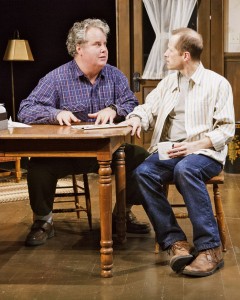 Hard bitten spinster Pauline (Hallie Foote) runs the store and takes care of the family’s youngest brother, mentally challenged Farley (Adam LeFevre). There’s also a middle brother, gay and emotionally stunted Henry (Tim Hopper), who returned home from college and may be too damaged to live on his own. It’s a fairly depressing scene, with Pauline simmering with bitterness over her plight.
Hard bitten spinster Pauline (Hallie Foote) runs the store and takes care of the family’s youngest brother, mentally challenged Farley (Adam LeFevre). There’s also a middle brother, gay and emotionally stunted Henry (Tim Hopper), who returned home from college and may be too damaged to live on his own. It’s a fairly depressing scene, with Pauline simmering with bitterness over her plight.
Although we are never sure what keeps the family together, brief monologues, spoken by each performer – but in the father’s voice – suggest that dad essentially loathed his family and felt only a kinship for the wild mountains and forests outside of town. The affection the father expresses for the natural world stands in a chilling contrast to the neglect felt by his children.
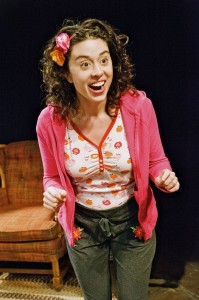 And yet, when the father dies, the three siblings make a huge discovery: Not only had the old man secretly bought up all the forest land around the town, he’s left it to his children with the implicit understanding that they’d keep the property as he loved it. The revelation of what has been left for the three children propels a moral drama that pits the father’s lifelong wishes with his daughter’s last-chance desire to create the life she always wanted. Will they sell the land for development, or conserve it as the pristine haven dad loved?
And yet, when the father dies, the three siblings make a huge discovery: Not only had the old man secretly bought up all the forest land around the town, he’s left it to his children with the implicit understanding that they’d keep the property as he loved it. The revelation of what has been left for the three children propels a moral drama that pits the father’s lifelong wishes with his daughter’s last-chance desire to create the life she always wanted. Will they sell the land for development, or conserve it as the pristine haven dad loved?
Evan Yionoulis’s direction possesses an evocative power that results in the ensemble’s deft and organically believable performances. The characters on display here crackle with emotions and power, whether it’s Pauline’s frigidly controlling bitterness or Henry’s miserable acceptance of his own inadequacy. There’s a real ferocity and desperation to the situations and we sense these people being motivated by both need and rage.
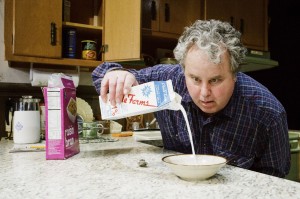 Nevertheless, Foote’s play suffers from a plot that doesn’t withstand much scrutiny. This is the sort of play that flows over you at first, but then on consideration, you notice ragged holes in the logic and in the philosophical underpinnings. Yes, the work turns on the moral conundrum of balancing the hateful father’s dying wishes vs. building gigantic houses all over the forests and mountains. But the moral absolutism is ultimately almost entirely forced: It’s not an either/or proposition, and our realization of this instantly deprives the work of its dramatic stakes – the passions flow unconnected to logic or believability. At times Foote seems to be striving to echo the mood of an Ibsen-like tragedy, but we don’t really buy into the situations or the conflict. The dad is dead – what is the point of honoring wishes that arose from spite and misanthropy?
Nevertheless, Foote’s play suffers from a plot that doesn’t withstand much scrutiny. This is the sort of play that flows over you at first, but then on consideration, you notice ragged holes in the logic and in the philosophical underpinnings. Yes, the work turns on the moral conundrum of balancing the hateful father’s dying wishes vs. building gigantic houses all over the forests and mountains. But the moral absolutism is ultimately almost entirely forced: It’s not an either/or proposition, and our realization of this instantly deprives the work of its dramatic stakes – the passions flow unconnected to logic or believability. At times Foote seems to be striving to echo the mood of an Ibsen-like tragedy, but we don’t really buy into the situations or the conflict. The dad is dead – what is the point of honoring wishes that arose from spite and misanthropy?
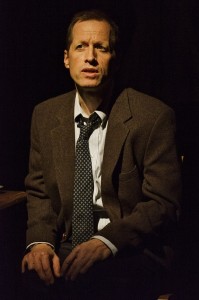 Haillie Foote’s hard bitten, impatient turn as Pauline is so tightly wound, you can almost see the impact of the father’s neglect on her. She’s nicely balanced by Hopper’s sad-faced failure of a brother – as weak and as mild as Pauline is fierce. Ironically, LeFevre’s turn as the handicapped youngest brother presents us with the sibling who’s the least damaged of the three: He’s just who he is and is pretty happy with himself.
Haillie Foote’s hard bitten, impatient turn as Pauline is so tightly wound, you can almost see the impact of the father’s neglect on her. She’s nicely balanced by Hopper’s sad-faced failure of a brother – as weak and as mild as Pauline is fierce. Ironically, LeFevre’s turn as the handicapped youngest brother presents us with the sibling who’s the least damaged of the three: He’s just who he is and is pretty happy with himself.
In the end, though, we’re struck with the lack of heft to the story – it’s so much less than meets the eye.
photos by James Leynse
Him
Primary Stages at 59E59 Theaters
scheduled to close on October 28, 2012
for tickets, call 212 279-4200 or visit http://www.primarystages.org
